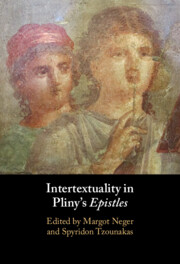Book contents
- Intertextuality in Pliny’s Epistles
- Intertextuality in Pliny’s Epistles
- Copyright page
- Contents
- Contributors
- Acknowledgements
- Abbreviations
- Introduction
- Part I Intertextuality and Interdiscursivity in Pliny’s Letters
- Part II Models and Anti-Models: Pliny’s Interaction with Oratory and Natural History
- Part III Pliny and Seneca: Discourses of Grief and Posthumous Reputation
- Part IV Pliny’s Villas and Their Poetic Models
- Part V Pliny Turns Nasty: Satire and the Scoptic Tradition
- Chapter 11 A Busy Day in Rome: Pliny, Epistles 1.9 Satirized by Horace, Satires 1.9
- Chapter 12 Putting Pallas out of Context: Pliny on the Roman Senate Voting Honours to a Freedman (Plin. Ep. 7.29 and 8.6)
- Chapter 13 Risus et indignatio: Scoptic Elements in Pliny’s Letters
- Part VI Final Thoughts: Discourses of Representation and Reproduction
- Bibliography
- General Subject Index
- Index Locorum
Chapter 13 - Risus et indignatio: Scoptic Elements in Pliny’s Letters
from Part V - Pliny Turns Nasty: Satire and the Scoptic Tradition
Published online by Cambridge University Press: 07 September 2023
- Intertextuality in Pliny’s Epistles
- Intertextuality in Pliny’s Epistles
- Copyright page
- Contents
- Contributors
- Acknowledgements
- Abbreviations
- Introduction
- Part I Intertextuality and Interdiscursivity in Pliny’s Letters
- Part II Models and Anti-Models: Pliny’s Interaction with Oratory and Natural History
- Part III Pliny and Seneca: Discourses of Grief and Posthumous Reputation
- Part IV Pliny’s Villas and Their Poetic Models
- Part V Pliny Turns Nasty: Satire and the Scoptic Tradition
- Chapter 11 A Busy Day in Rome: Pliny, Epistles 1.9 Satirized by Horace, Satires 1.9
- Chapter 12 Putting Pallas out of Context: Pliny on the Roman Senate Voting Honours to a Freedman (Plin. Ep. 7.29 and 8.6)
- Chapter 13 Risus et indignatio: Scoptic Elements in Pliny’s Letters
- Part VI Final Thoughts: Discourses of Representation and Reproduction
- Bibliography
- General Subject Index
- Index Locorum
Summary
Pliny the Younger’s Epistles contain a significant number of letters where Pliny presents himself as openly hostile to certain individuals by ridiculing them or expressing his indignation. The individuals who are the targets of Pliny’s epistolary invectives or satires usually do not appear as addressees in the collection: the chapter discusses Pliny’s letters 1.5 and 4.7 on Regulus, 7.29 and 8.6 on Pallas, 4.25 on an anonymous senator’s behaviour during a secret election and 6.15 on the faux pas of Iavolenus Priscus during a recitation. It then moves on with investigating how Pliny evokes the tradition of scoptic poetry, satire and invective not only in those letters where one would expect it, but also in letters which, at first glance, present themselves as friendly or joking conversations with various addressees such as Ep. 2.2 and 5.10. Here, the scoptic tone of literary models such as Catullus and Martial is transformed into a different context of communication, according to the conventions of epistolography.
- Type
- Chapter
- Information
- Intertextuality in Pliny's Epistles , pp. 259 - 278Publisher: Cambridge University PressPrint publication year: 2023

